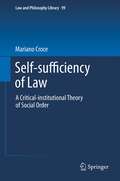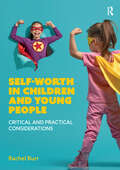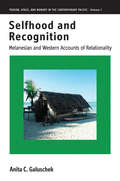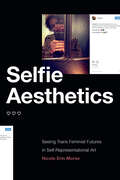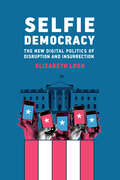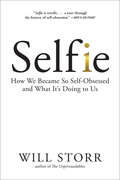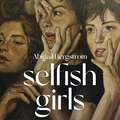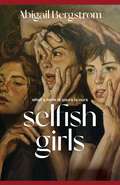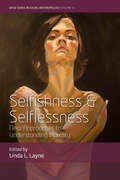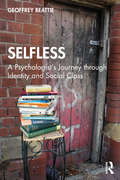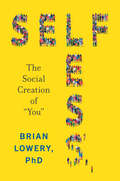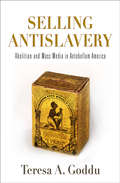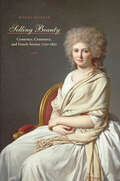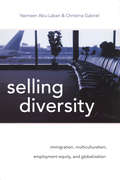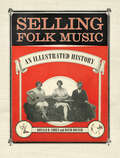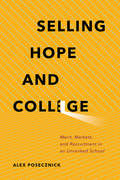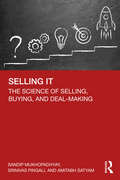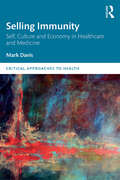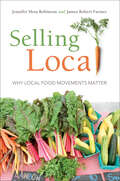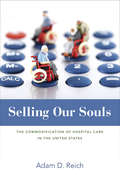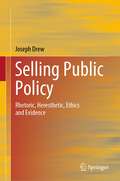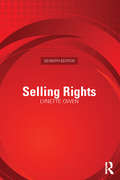- Table View
- List View
Self-sufficiency of Law
by Mariano CroceThe book investigates the role of law and legal experts in the organisational dynamics of a population, demonstrating that law is a stable practice among those who (in virtue of the special knowledge they master) are called upon to select the 'normative facts' of a population, i.e. the interactional standards that are proclaimed as binding for the entire population by the publicly recognised legal experts (whose peremptory judgments can be only revised by peers). It proposes an integration of the recent research outcomes achieved in three different areas of study: legal positivism, legal institutionalism and legal pluralism and examines the notions of rule, coercion, institution, practice elaborated by significant theorists in the mentioned areas and illumine both their merits and flaws. Furthermore it advances a notion of law and a description of the legal field which are able to account for the nature of the legal filed as the cradle of the social order. new back cover copy: In an era characterized by a streaking global pluralism, the collapse of many state agencies, the emergence of multiple sources of law, and the rise of informal justice, the idea of a unitary and homogenous legal system seems old-fashioned. But philosophers, sociologists and anthropologists still hold many debates on the nature of law and its function, which is that law represents an institution that characterizes any orderly social context of human beings, and this book plunges into the center of those debates. Self-sufficiency of Law: A Critical-institutional Theory of Social Order investigates the role of law and legal experts in the organizational dynamics of a population. It demonstrates that law is a stable practice among those who are called upon to select the "normative facts" of a population, that is, the interactional standards that are proclaimed as binding for the entire population by the publicly recognized legal experts. To do this, the author proposes an integration of the recent research outcomes achieved in three different areas of study--legal positivism, legal institutionalism and legal pluralism. He examines the notions of rule, coercion, institution and practice elaborated on by significant theorists in these fields, highlighting both the merits and flaws and ultimately advancing a notion of law and a description of the legal field which are able to account for the nature of the legal field as the cradle of social order. This text covers key guidelines for empirical research and political activities in Western and non-Western countries.
Self-worth in children and young people: Critical and practical considerations
by Rachel BurrChallenges current adult-led approaches to working with vulnerable young people, and introduces practitioners and students to creative methods that will enhance the self-worth of children and teenagers.Anthropologist and social worker, Rachel Burr, outlines clear communication techniques for working with children and young people to support them towards self-determination. By critically examining the dominant approaches to children and young people’s mental health, she provides straightforward practical strategies that can be used to address emotional upset, loss, and aid recovery.There has never been a more pressing time to encourage young people and children to engage in methods that allow them to develop a new sense of self-worth and purpose. Whether you’re a professional already working with children, or a student studying for a child-related qualification, this strength-based approach will help you to help children and young people develop a stronger sense of self which can be taken forward and used independently.
Selfhood and Recognition: Melanesian and Western Accounts of Relationality (Person, Space and Memory in the Contemporary Pacific #7)
by Anita C. GaluschekThe disciplines of philosophy and cultural anthropology have one thing in common: human behavior. Yet surprisingly, dialogue between the two fields has remained largely silent until now. Selfhood and Recognition combines philosophical and cultural anthropological accounts of the perception of individual action, exploring the processes through which a person recognizes the self and the other. Touching on humanity as porous, fractal, dividual, and relational, the author sheds new light on the nature of selfhood, recognition, relationality, and human life.
Selfie Aesthetics: Seeing Trans Feminist Futures in Self-Representational Art
by Nicole Erin MorseIn Selfie Aesthetics Nicole Erin Morse examines how trans feminine artists use selfies and self-representational art to explore transition, selfhood, and relationality. Morse contends that rather than being understood as shallow emblems of a narcissistic age, selfies can produce politically meaningful encounters between creators and viewers. Through close readings of selfies and other digital artworks by trans feminist artists, Morse details a set of formal strategies they call selfie aesthetics: doubling, improvisation, seriality, and nonlinear temporality. Morse traces these strategies in the work of Zackary Drucker, Vivek Shraya, Tourmaline, Alok Vaid-Menon, Zinnia Jones, and Natalie Wynn, showing how these artists present improvisational identities and new modes of performative resistance by conveying the materialities of trans life. Morse shows how the interaction between selfie creators and viewers constructs collective modes of being and belonging in ways that envision trans feminist futures. By demonstrating the aesthetic depth and political potential of selfie creation, distribution, and reception, Morse deepens understandings of gender performativity and trans experience.
Selfie Democracy: The New Digital Politics of Disruption and Insurrection
by Elizabeth LoshHow politicians&’ digital strategies appeal to the same fantasies of digital connection, access, and participation peddled by Silicon Valley.Smartphones and other digital devices seem to give us a direct line to politicians. But is interacting with presidential tweets really a manifestation of digital democracy? In Selfie Democracy, Elizabeth Losh examines the unintended consequences of politicians&’ digital strategies, from the Obama campaign&’s pioneering construction of an online community to Trump&’s Twitter dominance. She finds that politicians who use digital media appeal to the same fantasies of digital connection, access, and participation peddled by Silicon Valley. Meanwhile, smartphones and social media don&’t enable participatory democracy so much as they incentivize citizens to perform attention-getting acts of political expression. Losh explores presidential rhetoric casting digital media as tools of democracy, describes the conflation of gender and technology that contributed to Hillary Clinton&’s defeat in 2016, chronicles the Biden campaign&’s early digital stumbles in 2020, and recounts the TikTok campaign that may have spoiled a Trump rally. She shows that although Obama and Trump may seem diametrically opposed in both style and substance, they both used mobile digital media in ways that reshaped the presidency and promised a new kind of digital democracy. Obama used data and digital media to connect to citizens without intermediaries; Trump followed this strategy to its most extreme conclusion. What were the January 6 insurrectionists doing, as they livestreamed themselves and their cohorts attacking the Capitol, but practicing their own brand of selfie democracy?
Selfie: How We Became So Self-Obsessed and What It's Doing to Us
by Will Storr“An intriguing odyssey” though the history of the self and the rise of narcissism (The New York Times).Self-absorption, perfectionism, personal branding—it wasn’t always like this, but it’s always been a part of us. Why is the urge to look at ourselves so powerful? Is there any way to break its spell—especially since it doesn’t necessarily make us better or happier people? Full of unexpected connections among history, psychology, economics, neuroscience, and more, Selfie is a “terrific” book that makes sense of who we have become (NPR’s On Point). Award-winning journalist Will Storr takes us from ancient Greece, through the Christian Middle Ages, to the self-esteem evangelists of 1980s California, the rise of the “selfie generation,” and the era of hyper-individualism in which we live now, telling the epic tale of the person we all know so intimately—because it’s us.“It’s easy to look at Instagram and selfie-sticks and shake our heads at millennial narcissism. But Will Storr takes a longer view. He ignores the easy targets and instead tells the amazing 2,500-year story of how we’ve come to think about our selves. A top-notch journalist, historian, essayist, and sleuth, Storr has written an essential book for understanding, and coping with, the 21st century.” —Nathan Hill, New York Times-bestselling author of The Nix“This fascinating psychological and social history . . . reveals how biology and culture conspire to keep us striving for perfection, and the devastating toll that can take.”—The Washington Post “Ably synthesizes centuries of attitudes and beliefs about selfhood, from Aristotle, John Calvin, and Freud to Sartre, Ayn Rand, and Steve Jobs.” —USA Today“Eminently suitable for readers of both Yuval Noah Harari and Daniel Kahneman, Selfie also has shades of Jon Ronson in its subversive humor and investigative spirit.” —Bookseller“Storr is an electrifying analyst of Internet culture.” —Financial Times“Continually delivers rich insights . . . captivating.” —Kirkus Reviews
Selfish Girls: The dark and gripping novel of family dynamics and toxic sisterhood from the much-acclaimed author of WHAT A SHAME
by Abigail Bergstrom✨'I read this book obsessively, that's how much I adored it . . . a dark, messy and beautiful story about family, love and sisterhood' STYLIST✨✨'A suspenseful thriller and a subtle portrait of domestic interactions, with a healthy dose of humour and hope offsetting its darker moments' HARPER'S BAZAAR✨'A dark, deeply intimate exploration of sisterhood in all it's messy, complex glory. Beautifully written and thoroughly compelling' Yomi Adegoke, Sunday Times bestselling author of The List✨✨'Sharply real and ethereal, as though reading this novel enters you into a deep dream-like state' Emma Gannon, Sunday Times bestseller✨ ✨'Selfish Girls is an outstanding novel, pithy and singular, gloriously dark and compelling, a must read! Salena Godden, author of Mrs Death Misses Death✨✨'Bergstrom is a new voice but sure to be an enduring one' Caroline O'Donoghue ✨✨'If anyone is qualified to write about what it means to be a young woman in Britain today, it's Abigail Bergstrom' Sunday Times✨ NOTHING HURTS LIKE FAMILY.Ines is reluctantly moving home on the edge of a breakdown, her childhood sweetheart in tow. He's only ever wanted what was best for her.Gwen is elated that her prodigal daughter has returned.Dylan is still licking her wounds from a rejection she can't forget.And Emma is quietly suffocating in the perfect marriage she wanted so badly.They were inseparable once. But that was a long time ago. Now, they're back in the Welsh town where they grew up, peeling back the layers of a once forgotten, haunting past. What they find may be the end of them...Uninhibited, claustrophobic and emotionally complex, Selfish Girls spans generations, buried resentments, and an unexpected love story. It is a clear-eyed portrait of a dysfunctional family and the pain we inflict on those we love most.Readers have fallen in love with Selfish Girls'A must read, multigenerational family saga exploring trauma, love, hardship and identity. What Bergstrom has achieved here is outstanding. I can't recommend it highly enough'⭐⭐⭐⭐⭐Reader Review'One of my most anticipated reads of the year . . . and it didn't disappoint. Bergstrom writes with such rawness and her characters have such vulnerability that you can't help but fall in love with them' ⭐⭐⭐⭐⭐Reader Review'Oh my god, she's done it again. It's exquisite. 10 out of 10. No notes . . . we're in our sad girl summer era, and this book is the perfect accompaniment' ⭐⭐⭐⭐⭐Reader Review'My, oh, my, what a book! Full of action and angst, this is not to be missed . . . absolutely fabulous!' ⭐⭐⭐⭐⭐Reader Review'Harrowing and painful at times, but also beautiful' ⭐⭐⭐⭐⭐Reader Review
Selfish Girls: The dark and gripping novel of family dynamics and toxic sisterhood from the much-acclaimed author of WHAT A SHAME
by Abigail Bergstrom✨'If anyone is qualified to write about what it means to be a young woman in Britain today, it's Abigail Bergstrom' SUNDAY TIMES ✨✨ 'Bergstrom is a new voice but sure to be an enduring one' Caroline O'Donoghue ✨✨'One of the cleverest and boldest writers I've ever read' Scarlett Curtis ✨ ✨ 'A glorious new talent has arrived' Emma Gannon ✨NOTHING HURTS LIKE FAMILY.Ines is reluctantly moving home on the edge of a breakdown, her childhood sweetheart in tow. He's only ever wanted what was best for her.Gwen is elated that her prodigal daughter has returned.Dylan is still licking her wounds from a rejection she can't forget.And Emma is quietly suffocating in the perfect marriage she wanted so badly.They were inseparable once. But that was a long time ago. Now, they're back in the Welsh town where they grew up, peeling back the layers of a once forgotten, haunting past. What they find may be the end of them...Uninhibited, claustrophobic and emotionally complex, Selfish Girls spans generations, buried resentments, and an unexpected love story. It is a clear-eyed portrait of a dysfunctional family and the pain we inflict on those we love most.PRAISE FOR SELFISH GIRLS'Anyone who has a sister knows what a treasured, complex, fraught and precious bond it is - a theme that Abigail Bergstrom puts at the heart of her new psychologically charged novel Selfish Girls . . . this is at once a suspenseful thriller and a subtle portrait of domestic interactions, with a healthy dose of humour and hope offsetting its darker moments' Harper's Bazaar'Sharply real and ethereal, as though reading this novel enters you into a dream-like state' Emma Gannon, Sunday Times bestseller'Selfish Girls is an outstanding novel: pithy and singular, gloriously dark and compelling, a must read!' Salena Godden, author of Mrs Death Misses Death'Sisterhood at its darkest and it's most beautiful - every time you think you understand, Bergstrom reveals a new, breathtaking layer' Monika Radojevic, #Merky Books New Writers' Prize winning author of A Beautiful Lack of Consequence'An exceptionally clever and moving portrait of the messy realities of sisterhood - it took my breath away' Olivia Petter, award-winning journalist and author of Gold Rush'The best book I've read in years' Lucy Blakiston, Shit You Should Care About'Selfish Girls is a masterclass in emotional storytelling. A searing, beautifully written portrait of messy love, buried pain, and the bonds that refuse to break. I couldn't look away' Amie McNee, author and creator of @inspiredtowrite 'With great empathy and precision, Bergstrom has created a family portrait that's richly detailed and deeply intimate' Chloë Ashby, critically-acclaimed author of Second Self 'Bold, lean and enduring' Maxine Mei-Fung Chung, author of What Women Want'Deceit, pain and absent mothers, I held my breath at the end. What a perfect book' Alex Holder, author and owner of Salted Books
Selfish Women
by Lisa DowningThis book proceeds from a single and very simple observation: throughout history, and up to the present, women have received a clear message that we are not supposed to prioritize ourselves. Indeed, the whole question of "self" is a problem for women – and a problem that issues from a wide range of locations, including, in some cases, feminism itself. When women espouse discourses of self-interest, self-regard, and selfishness, they become illegible. This is complicated by the commodification of the self in the recent Western mode of economic and political organization known as "neoliberalism," which encourages a focus on self-fashioning that may not be identical with self-regard or self-interest. Drawing on figures from French, US, and UK contexts, including Rachilde, Ayn Rand, Margaret Thatcher, and Lionel Shriver, and examining discourses from psychiatry, media, and feminism with the aim of reading against the grain of multiple orthodoxies, this book asks how revisiting the words and works of selfish women of modernity can assist us in understanding our fraught individual and collective identities as women in contemporary culture. And can women with politics that are contrary to the interests of the collective teach us anything about the value of rethinking the role of the individual? This book is an essential read for those with interests in cultural theory, feminist theory, and gender politics.
Selfishness and Selflessness: New Approaches to Understanding Morality (WYSE Series in Social Anthropology #10)
by Linda L. LayneWe are said to be suffering a narcissism epidemic when the need for collective action seems more pressing than ever. Selfishness and selflessness address the ‘proper’ and ‘improper’ relationship between one’s self and others. The work they do during periods of social instability and cultural change is probed in this original, interdisciplinary collection. Contributions range from an examination of how these concepts animated the eighteenth-century anti-slavery campaigners to dissecting the way middle-class mothers’ experiences illustrate gendered struggles over how much and to whom one is morally obliged to give.
Selfishness and Selflessness: New Approaches to Understanding Morality (WYSE Series in Social Anthropology #10)
by Linda L. LayneWe are said to be suffering a narcissism epidemic when the need for collective action seems more pressing than ever. The traits of Selfishness and selflessness address the ‘proper’ and ‘improper’ relationship between one’s self and others. The work they do during periods of social instability and cultural change is probed in this original, interdisciplinary collection. Contributions range from an examination of how these concepts animated the eighteenth-century anti-slavery campaigners to a dissection of the way middle-class mothers’ experiences illustrate gendered struggles over how much and to whom one is morally obliged to give.
Selfless: A Psychologist's Journey Through Identity And Social Class
by Geoffrey BeattieSelfless is a memoir, reflecting on identity, social class, mobility, education, and on psychology itself; how psychology as a discipline is conducted, how it prioritises objects of study, how it uncovers psychological truths about the world. Geoffrey Beattie takes the reader on a journey through his early life in working-class Belfast, his Ph.D. at Trinity College Cambridge and subsequent academic and professional career, to explore fundamental issues within psychology about social class and social identity. Beattie discusses the difficulties inherent in this process of education and change, and how social background affects how you view academic work and the subject matter of one’s discipline. This book movingly details a life and how it is changed by the processes of education, the psychological pressures when abandoning those close to you, the dissonance within and how it feels and operates. The book takes a critical look at psychology from the other side, and examines the process of becoming ‘selfless’, meaning having little sense of self rather than being overly concerned with the wishes and needs of others. Showing how our early experiences and their influence continues throughout life, Beattie’s emotionally engaging, entertaining, and witty text offers general readers, students, and academics fresh insights into psychology, adaptation and personal change.
Selfless: The Social Creation of “You”
by Brian LowerySocial psychologist and Stanford professor Brian Lowery presents a provocative, powerful theory of identity, arguing that there is no essential "self"—our selves are social creations of those with whom we interact —exploring what that means for who we can be and who we allow others to be. There’s nothing we spend more time with, but understand less, than ourselves. You’ve been with yourself every waking moment of your life. But who—or, rather, what—are you? In Selfless, Brian Lowery argues for the radical idea that the “self” as we know it—that “voice in your head”—is a social construct, created in our relationships and social interactions. We are unique because our individual pattern of relationships is unique. We change because our relationships change. Your self isn’t just you, it’s all around you.Lowery uses this research-driven perspective of selfhood to explore questions of inequity, race, gender, politics, and power structures, transforming our perceptions of how the world is and how it could be. His theory offers insight into how powerful people manage their environment in sophisticated, often unconscious, ways to maintain the status quo; explains our competing drives for deep social connection and personal freedom; and answers profound, personal questions such as: Why has my sense of self evolved over time? Why do I sometimes stop short of changes that I want to make in life? In Selfless, Lowery persuasively breaks down common assumptions and beliefs; his insights are humbling. Despite what many may think, we aren’t islands unto ourselves; we are the creation of the many hands that touch us. We don’t just exist in communities, we are created and shaped by them. Our highs and lows are not only our own but belong to others as well. By recognizing that we are products of relationships—from fleeting transactions to deep associations—we shatter the myth of individualism and free ourselves to make our lives and the world accordingly.
Selling Antislavery: Abolition and Mass Media in Antebellum America (Material Texts)
by Teresa A. GodduA richly illustrated history of the American Anti-Slavery Society and its print, material, and visual artifactsBeginning with its establishment in the early 1830s, the American Anti-Slavery Society (AASS) recognized the need to reach and consolidate a diverse and increasingly segmented audience. To do so, it produced a wide array of print, material, and visual media: almanacs and slave narratives, pincushions and gift books, broadsides and panoramas. Building on the distinctive practices of British antislavery and evangelical reform movements, the AASS utilized innovative business strategies to market its productions and developed a centralized distribution system to circulate them widely. In Selling Antislavery, Teresa A. Goddu shows how the AASS operated at the forefront of a new culture industry and, by framing its media as cultural commodities, made antislavery sentiments an integral part of an emerging middle-class identity. She contends that, although the AASS's dominance waned after 1840 as the organization splintered, it nevertheless created one of the first national mass markets.Goddu maps this extensive media culture, focusing in particular on the material produced by AASS in the decade of the 1830s. She considers how the dissemination of its texts, objects, and tactics was facilitated by the quasi-corporate and centralized character of the organization during this period and demonstrates how its institutional presence remained important to the progress of the larger movement. Exploring antislavery's vast archive and explicating its messages, she emphasizes both the discursive and material aspects of antislavery's appeal, providing a richly textured history of the movement through its artifacts and the modes of circulation it put into place.Featuring more than seventy-five illustrations, Selling Antislavery offers a thorough case study of the role of reform movements in the rise of mass media and argues for abolition's central importance to the shaping of antebellum middle-class culture.
Selling Beauty: Cosmetics, Commerce, and French Society, 1750–1830 (The Johns Hopkins University Studies in Historical and Political Science #127)
by Morag MartinMorag Martin’s history of the cosmetic industry in France examines the evolution of popular tastes and standards of beauty during the late 18th and early 19th centuries. As the French citizenry rebelled against the excesses of the aristocracy, there was a parallel shift in consumer beauty practices. Powdered wigs, alabaster white skin, and rouged cheeks disappeared in favor of a more natural and simple style. Selling Beauty challenges expectations about past fashions and offers a unique look into consumer culture and business practices. Martin introduces readers to the social and economic world of cosmetic production and consumption, recounts criticisms against the use of cosmetics from a variety of voices, and examines how producers and retailers responded to quickly evolving fashions.Martin shows that the survival of the industry depended on its ability to find customers among the emerging working and middle classes. But the newfound popularity of cosmetics raised serious questions. Critics—from radical philosophes to medical professionals—complained that the use of cosmetics was a threat to social morals and questioned the healthfulness of products that contained arsenic, mercury, and lead. Cosmetic producers embraced these withering criticisms, though, skillfully addressing these concerns in their marketing campaigns, reassuring consumers of the moral and physical safety of their products. Rather than disappearing along with the Old Regime, the commerce of cosmetics, reimagined and redefined, flourished in the early 19th century, as political ideals and Enlightenment philosophies radically altered popular sentiment.
Selling Diversity: Immigration, Multiculturalism, Employment Equity, And Globalization
by Yasmeen Abu-Laban Christina GabrielSince the 1990s, Canadian policy prescriptions for immigration, multiculturalism, and employment equity have equated globalization with global markets. This interpretation has transformed men and women of various ethnic backgrounds into trade-enhancing commodities who must justify their skills and talents in the language of business. This particular neo-liberal reading of globalization and public policy has resulted in a trend the authors call selling diversity. Using gender, race/ethnicity, and class lenses to frame their analysis, the authors review Canadian immigration, multiculturalism, and employment equity policies, including their different historical origins, to illustrate how a preference for selling diversity has emerged in the last decade. In the process they suggest that a commitment to enhance justice in a diverse society and world has been muted. Yet, neo-liberalism is not the only or inevitable option in this era of globalization, and Canadians are engaging in transnational struggles for rights and equality and thereby increasing the interconnectedness between peoples across the globe. Consequently, the emphasis on selling diversity might be challenged.
Selling Ethnic Neighborhoods: The Rise of Neighborhoods as Places of Leisure and Consumption (Routledge Advances in Geography)
by Jan Rath Volkan AytarWhile ethnic neighborhoods are usually associated with poverty, crime and social problems, they have also emerged as places of leisure and consumption, providing opportunities for numerous entrepreneurs and employees. Local and national governments and other regulatory actors, as well as the media, have started to see and promote these neighborhoods as urban attractions for tourists, city dwellers and others. This book aims to analyze the roles of ethnic entrepreneurs and their associations and governments, and - by extension - of consumers and other actors in the rise of ethnic neighborhoods as places of leisure and consumption. Through case studies, it situates those neighborhoods at the edge of different theoretical debates about urban political economy and the politics of culture, and seeks a dynamic synergy between both.
Selling Folk Music: An Illustrated History (American Made Music Series)
by Ronald D. Cohen David BonnerSelling Folk Music: An Illustrated History highlights commercial sources that reveal how folk music has been packaged and sold to a broad, shifting audience in the United States. Folk music has a varied and complex scope and lineage, including the blues, minstrel tunes, Victorian parlor songs, spirituals and gospel tunes, country and western songs, sea shanties, labor and political songs, calypsos, pop folk, folk-rock, ethnic, bluegrass, and more. The genre is of major importance in the broader spectrum of American music, and it is easy to understand why folk music has been marketed as America's music. Selling Folk Music presents the public face of folk music in the United States via its commercial promotion and presentation throughout the twentieth century. Included are concert flyers; sheet music; book, songbook, magazine, and album covers; concert posters and flyers; and movie lobby cards and posters, all in their original colors. The 1964 hootenanny craze, for example, spawned such items as a candy bar, pinball machine, bath powder, paper dolls, Halloween costumes, and beach towels. The almost five hundred images in Selling Folk Music present a new way to catalog the history of folk music while highlighting the transformative nature of the genre. Following the detailed introduction on the history of folk music, illustrations from commercial products make up the bulk of the work, presenting a colorful, complex history.
Selling Hope and College: Merit, Markets, and Recruitment in an Unranked School
by Alex PosecznickIt has long been assumed that college admission should be a simple matter of sorting students according to merit, with the best heading off to the Ivy League and highly ranked liberal arts colleges and the rest falling naturally into their rightful places. Admission to selective institutions, where extremely fine distinctions are made, is characterized by heated public debates about whether standardized exams, high school transcripts, essays, recommendation letters, or interviews best indicate which prospective students are "worthy."And then there is college for everyone else. But what goes into less-selective college admissions in an era when everyone feels compelled to go, regardless of preparation or life goals? "Ravenwood College," where Alex Posecznick spent a year doing ethnographic research, was a small, private, nonprofit institution dedicated to social justice and serving traditionally underprepared students from underrepresented minority groups. To survive in the higher education marketplace, the college had to operate like a business and negotiate complex categories of merit while painting a hopeful picture of the future for its applicants. Selling Hope and College is a snapshot of a particular type of institution as it goes about the business of producing itself and justifying its place in the market. Admissions staff members were burdened by low enrollments and worked tirelessly to fill empty seats, even as they held on to the institution’s special spirit. Posecznick documents what it takes to keep a "mediocre" institution open and running, and the struggles, tensions, and battles that members of the community tangle with daily as they carefully walk the line between empowering marginalized students and exploiting them.
Selling IT: The Science of Selling, Buying, and Deal-Making
by Amitabh Satyam Sandip Mukhopadhyay Srinivas PingaliInformation technology (IT) is an essential core of the economy today. Corporations and governments worldwide rely on it to drive their core strategy and develop and execute business models. Amounting to over 3.7 trillion US dollars of worldwide spending, the growing significance of the IT industry in the global economy is now well established. Hence, it is crucial to understand the marketplace within which it exists, and this book presents a systematic analysis of the processes, techniques, and methods involved in IT sales and marketing. In Selling IT, the book: Integrates a large IT provider’s selling process with the enterprise user’s IT buying process to highlight the nuances of selling, marketing, and developing IT solutions that create value for customers. Discusses various key concepts such as value-based IT selling, business case for IT acquisition, vendor evaluation and management, account and customer relationship management, customer segmentation, and techniques for customer acquisition and retention. Analyses the challenges and opportunities involved in selling digital IT and examines the evolution of jobs and careers based on the changed IT landscape. Includes lesson plans, case studies, and chapter-wise practice questions to support teaching and learning. The book boasts a robust theoretical foundation supported by a clear exposition of concepts and management theories. It will be of benefit to professionals using organisation-mandated selling processes. Young executives with a technology background looking for a sales and marketing career in the IT industry can also effectively use this book. It will also be an essential read for scholars and researchers in B2B marketing, IT consulting, technology sales, and digital transformation.
Selling Immunity Self, Culture and Economy in Healthcare and Medicine (Critical Approaches to Health)
by Mark DavisSelling Immunity: Self, Culture and Economy in Healthcare and Medicine provides a groundbreaking study of the ways in which immunity shapes life. Through its up-to-date discussion of immunity cultures, alongside detailed real-world examples, the book demonstrates how immunity is enmeshed in concepts of possessive individualism, self-defence and health consumerism. The book explores the rich metaphorical powers of immunity and the life narratives it inspires with reference to the talk of scientists, immunology texts and popular science magazines. The author provides a detailed overview of the ways in which digital media can shape the immune self with reference to cultural and social theories, providing insight into how immunitary knowledge and products are consumed and the benefits and drawbacks this has for healthcare. The book considers the significance of immunity for individuals navigating the threats to health that arise with pandemics and superbugs, with a keen look into how these ideas surface in everyday life across the globe. Finally, the book also discusses economic bases of healthcare technologies bent towards the protection and restoration of immunity. This book is essential reading for professionals within the fields of psychology, sociology, biomedical science, healthcare and other related disciplines. A broader audience will appreciate the book’s attention on the ways immunity is understood to be a personal possession, an object of life craft, and the basis for healthcare consumerism.
Selling Local: Why Local Food Movements Matter
by James Robert Farmer Jennifer Meta RobinsonIn an era bustling with international trade and people on the move, why has local food become increasingly important? How does a community benefit from growing and buying its own produce, rather than eating food sown and harvested by outsiders? Selling Local is an indispensable guide to community-based food movements, showcasing the broad appeal and impact of farmers’ markets, community supported agriculture programs, and food hubs, which combine produce from small farms into quantities large enough for institutions like schools and restaurants. After decades of wanting food in greater quantities, cheaper, and standardized, Americans now increasingly look for quality and crafting. Grocery giants have responded by offering "simple" and "organic" food displayed in folksy crates with seals of organizational approval, while only blocks away a farmer may drop his tailgate on a pickup full of freshly picked sweet corn. At the same time, easy-up umbrellas are likely to unfurl over multi-generational farmers’ markets once or twice a week in any given city or town. Drawing on prodigious fieldwork and research, experts Jennifer Meta Robinson and James Robert Farmer unlock the passion for and promise of local food movements, show us how they unfold practically in towns and on farms, and make a persuasive argument for how much they deeply matter to all of us.
Selling Our Souls: The Commodification of Hospital Care in the United States
by Adam Dalton ReichHealth care costs make up nearly a fifth of U.S. gross domestic product, but health care is a peculiar thing to buy and sell. Both a scarce resource and a basic need, it involves physical and emotional vulnerability and at the same time it operates as big business. Patients have little choice but to trust those who provide them care, but even those providers confront a great deal of medical uncertainty about the services they offer. Selling Our Souls looks at the contradictions inherent in one particular health care market—hospital care. Based on extensive interviews and observations across the three hospitals of one California city, the book explores the tensions embedded in the market for hospital care, how different hospitals manage these tensions, the historical trajectories driving disparities in contemporary hospital practice, and the perils and possibilities of various models of care.As Adam Reich shows, the book's three featured hospitals could not be more different in background or contemporary practice. PubliCare was founded in the late nineteenth century as an almshouse in order to address the needs of the destitute. HolyCare was founded by an order of nuns in the mid-twentieth century, offering spiritual comfort to the paying patient. And GroupCare was founded in the late twentieth century to rationalize and economize care for middle-class patients and their employers. Reich explains how these legacies play out today in terms of the hospitals' different responses to similar market pressures, and the varieties of care that result.Selling Our Souls is an in-depth investigation into how hospital organizations and the people who work in them make sense of and respond to the modern health care market.
Selling Public Policy: Rhetoric, Heresthetic, Ethics and Evidence
by Joseph DrewProfessor Drew’s latest work makes the case that even great public policy needs to be deliberately and strategically sold in order for it to ultimately be considered a success. However, it seems that most people charged with the task of selling public policy simply do not have the requisite skills to do so.Selling public policy is an art that draws on disparate strands of scholarship spanning the political sciences, economics, sociology, ethics and the classics. To perform the art of selling public policy one must first master the lessons from the greats in the field. Following this, it is necessary to learn how to apply the knowledge to real-world complex scenarios in such a way that the policy is indeed sold and stays sold over the implied returns period.This book is unique in the corpus of scholarly literature because it provides both the knowledge and real-world case studies required for students, scholars, and policy practitioners to master the art of selling public policy.
Selling Rights
by Lynette OwenSelling Rights has firmly established itself as the leading guide to all aspects of rights sales and co-publications throughout the world. The seventh edition is substantially updated to illustrate the changes in rights in relation to new technologies and legal developments in the United Kingdom and the rest of the world. This fully revised and updated edition includes: coverage of the full range of potential rights from English-language territorial rights through to serial rights, permissions, rights for the reading-impaired, translation rights, dramatization and documentary rights, electronic and multimedia rights More detailed coverage of Creative Commons and Open Access The aftermath of the Digital Economy Act 2010, the Hooper Report and new UK Statutory Instruments affecting copyright Updated coverage of book fairs The implications of adding e-book rights to print licences A separate chapter on collective licensing via Reproduction Rights Organizations The impact of new electronic hardware (e-readers, tablets, mobile phones) – the distinction between sales and licences the rights implications of acquisitions, mergers and disposals updates on serial rights, including online New appendices listing territories normally sought as exclusive by UK publishers and a glossary of rights specific terms. Selling Rights is an essential reference tool and an accessible and illuminating guide to current and future issues for rights professionals and students of publishing.
